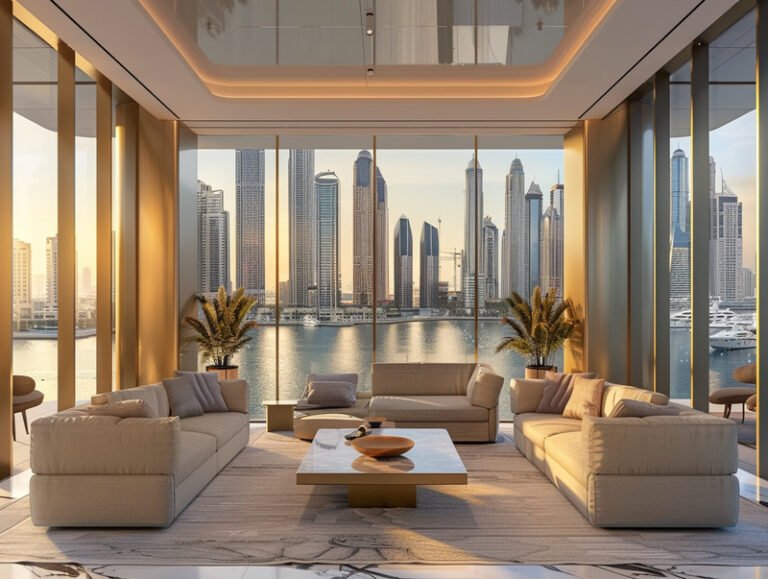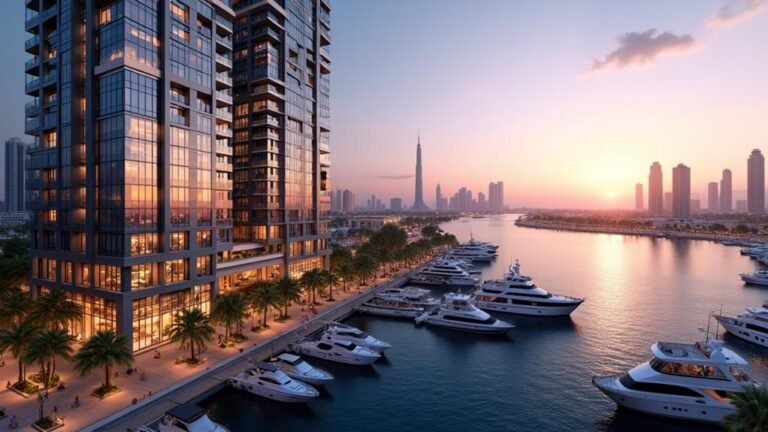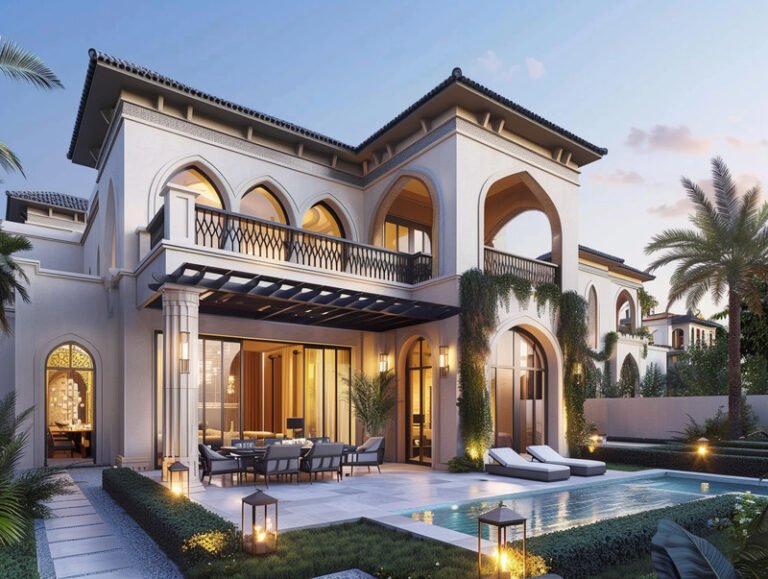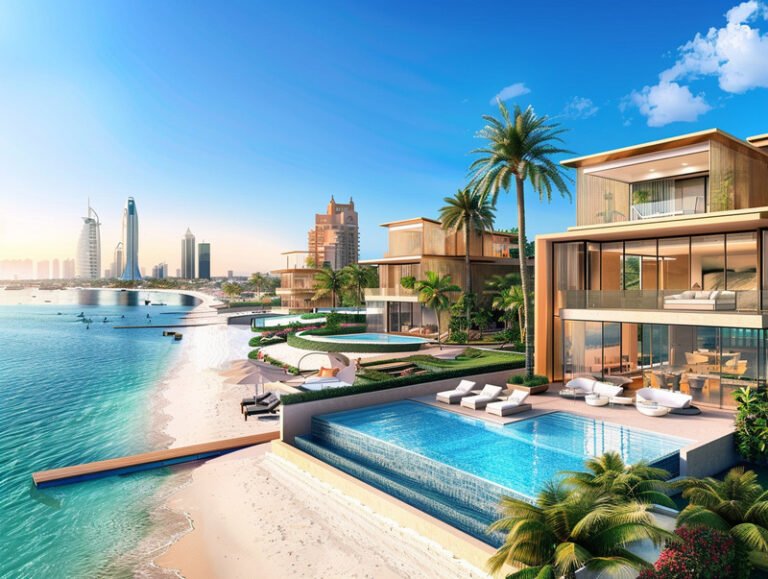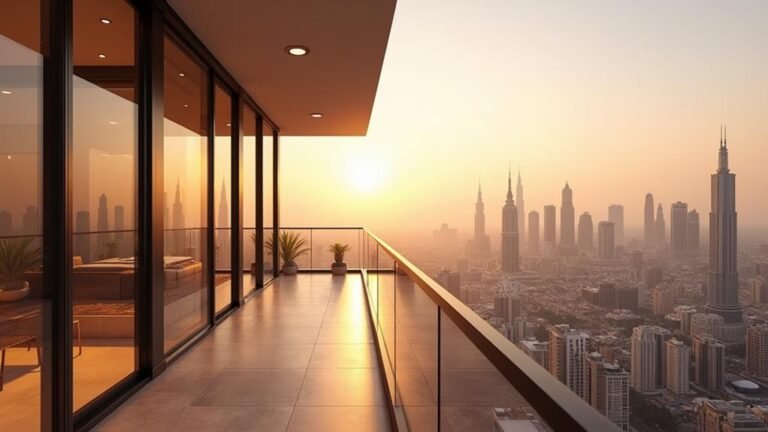Tips on Searching for the Right Property in Dubai
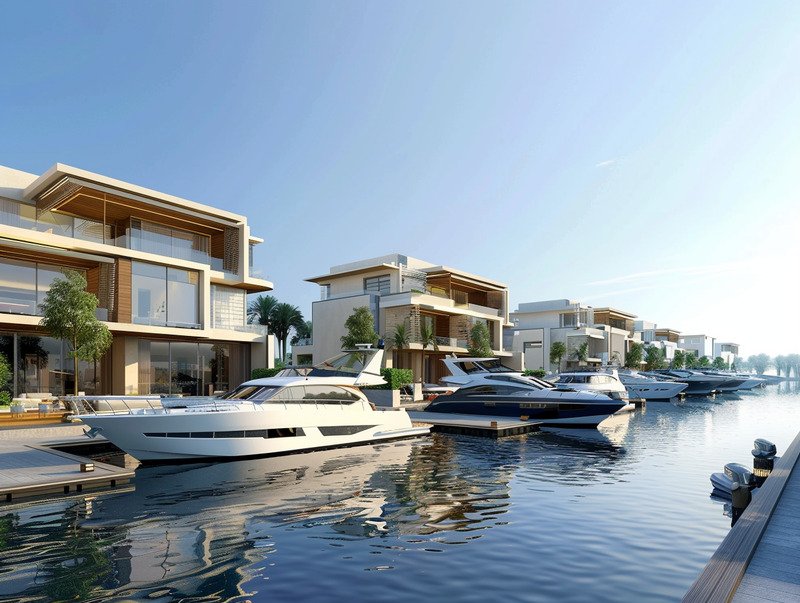
To find the right property in Dubai, start by researching the market through online platforms like Bayut, Property Finder, and Dubizzle. Set a realistic budget considering additional costs like registration fees and maintenance.
Choose a location based on proximity to work, schools, and amenities. Evaluate different property types such as apartments, villas, and townhouses for their space and privacy.
Prioritize essential amenities and check the developer's reputation through reviews and past projects. Understand the legal requirements and consider consulting a real estate agent for expert advice and access to exclusive listings.
By following these steps, you'll be well-prepared for your property search.
Let us help you find the perfect property. Contact us to get started.
Research the Market
To find the right property in Dubai, you've got to delve into the market trends and understand the current prices and future projections. Begin by examining the various neighborhoods, as each area has its unique characteristics and price range. For instance, properties in Downtown Dubai may have a different price trajectory compared to those in Jumeirah or Dubai Marina.
Next, leverage online resources like real estate websites and market reports to gather data. Websites such as Bayut, Property Finder, and Dubizzle regularly provide updates on average property prices, rental yields, and market forecasts. These platforms can help you compare prices and spot trends over time.
Additionally, attending property exhibitions and forums can provide valuable insights. Events like Cityscape Global offer a comprehensive view of the real estate market, showcasing upcoming projects and allowing you to speak directly with developers and industry experts.
It's also essential to consult with local real estate agents who possess in-depth knowledge of the market. They can provide personalized advice based on your preferences and needs.
Set a Realistic Budget
Once you've analyzed the market trends, it's time to set a realistic budget for your property investment. Start by evaluating your financial situation, including your income, savings, and any existing loans or debts. It's important to know how much you can afford to spend without compromising your financial stability. Consider consulting with a financial advisor to get a clearer picture of your budget limits.
Next, factor in additional costs beyond the property price. These might include registration fees, agent commissions, maintenance costs, and service charges. Don't forget to account for potential renovation expenses if the property requires any improvements. It's wise to have a contingency fund to cover unexpected expenses.
Financing options are also crucial. Research mortgage options available in Dubai and compare interest rates, repayment terms, and eligibility criteria. Make sure you're pre-approved for a mortgage before making any commitments. This step not only streamlines the buying process but also gives you a clear idea of your borrowing capacity.
Choose the Right Location
Choosing the right location is essential for maximizing your investment and ensuring long-term satisfaction with your property. When searching for a property in Dubai, consider factors such as proximity to work, schools, and amenities. Think about the daily commute and access to public transportation, which can notably affect your quality of life. Research neighborhoods thoroughly to understand their growth potential, safety, and community vibe.
Different areas in Dubai cater to various lifestyles. For example, if you prefer a bustling urban environment, Downtown Dubai or Dubai Marina might be ideal. These areas offer a range of dining, shopping, and entertainment options. On the other hand, if you desire a quieter, family-friendly atmosphere, consider looking at Jumeirah or Arabian Ranches, which provide more residential settings with parks and schools nearby.
Additionally, consider the future development plans for each location. Areas like Dubai South and Al Furjan are rapidly developing and could offer notable value appreciation over time. Always visit the location in person to get a true feel of the area. Speak with current residents if possible, as they can provide valuable insights into the neighborhood's pros and cons.
Understand Property Types
After narrowing down the perfect location, you should explore the different types of properties available to match your lifestyle and investment goals. Dubai offers a wide range of property types, each catering to different needs and preferences. Primarily, you'll encounter apartments, villas, townhouses, and commercial properties.
Apartments are prevalent in high-rise buildings and are ideal for those seeking a modern, urban lifestyle. They come in various sizes, from studios to multi-bedroom units, and often include amenities like gyms, pools, and security services.
Villas, on the other hand, provide more space and privacy, usually featuring gardens, private pools, and multiple bedrooms. They're perfect for families or those desiring a more tranquil living environment.
Townhouses strike a balance between apartments and villas. They offer a multi-floor living space, often with a small garden or terrace, and are situated in gated communities. These are suitable for small families or individuals looking for a bit more space than an apartment can offer.
Lastly, commercial properties, such as office spaces and retail units, are available for those interested in business investments. Understanding these property types will help you make an informed decision that aligns with your needs.
Evaluate Amenities
When evaluating properties, prioritize amenities that will enhance your lifestyle and meet your daily needs. Begin by considering essential conveniences such as proximity to supermarkets, healthcare facilities, and schools. These amenities will ensure that your daily routines are seamless and stress-free.
Additionally, think about recreational facilities like swimming pools, gyms, and parks. Such features can greatly improve your quality of life, offering convenient options for exercise and leisure.
Next, focus on security features within the property. Gated communities, 24/7 security personnel, and surveillance systems provide peace of mind and guarantee a safe living environment. Also, consider the availability of parking spaces, especially if you own a vehicle. Adequate parking can save you time and add to your convenience.
Moreover, modern amenities like high-speed internet connectivity and smart home systems can enhance your living experience. These technologies offer both comfort and efficiency, making your home more adaptable to contemporary needs.
Check Developer Reputation
Evaluating the reputation of the developer is essential to guarantee you're investing in a high-quality property. In Dubai, several developers have established themselves as trustworthy, delivering projects on time and maintaining high construction standards. Start by researching the developer's background. Look into their past projects and note any recurring issues like delays or poor construction quality.
Check online reviews and forums for feedback from previous buyers. These sources can provide real-world insights into the developer's reliability and customer service. In addition, verify if the developer has received any industry awards or certifications, which can indicate a commitment to excellence.
It's also a good idea to consult with local real estate agents who've experience with various developers. They can offer valuable perspectives based on their professional dealings.
Furthermore, consider visiting some of the developer's completed projects to assess the build quality and overall maintenance.
Inspect the Property
Now that you've assessed the developer's reputation, it's time to thoroughly inspect the property to make sure it meets your standards. Start by examining the overall condition of the building and its surrounding areas. Look for signs of wear and tear, such as cracks in the walls, leaks, or any visible damage. Pay attention to the quality of the construction materials used, and verify that the finishes are up to your expectations.
Next, check the functionality of essential systems like plumbing, electrical wiring, and air conditioning. Turn on taps to test water pressure and temperature, and confirm all electrical outlets and switches are operational. Inspect the air conditioning units to ensure they're in good working condition, as Dubai's climate necessitates reliable cooling systems.
Additionally, evaluate the layout and space of the property. Make sure the rooms are well-designed and that the space meets your needs. Consider natural light and ventilation, as these are important for a comfortable living environment.
Don't forget to inspect shared amenities such as gyms, pools, and common areas to make sure they're well-maintained and accessible.
Review Legal Requirements
Make certain you understand the legal requirements before finalizing your property purchase in Dubai. It's important to familiarize yourself with the regulations governing property transactions in the UAE to avoid any legal complications.
First, be aware that non-residents can only buy property in designated freehold areas. These are specific zones where foreign ownership is permitted.
Next, confirm you have a valid passport and, if required, a visa. You'll also need a No Objection Certificate (NOC) from the developer if you're buying a property under construction. This document confirms that there are no outstanding debts or issues related to the property.
In addition, comprehend the Dubai Land Department (DLD) registration process. You must register the property with the DLD to make the transaction legally binding. This involves paying a registration fee, typically around 4% of the property’s purchase price. Once the property is registered with the DLD, the ownership and details of the property will be officially recorded in the Dubai Land Department’s database. This is an essential step in the property registration process in Dubai, ensuring that the property ownership is legally recognized and protected. It also provides transparency and security for both the buyer and the seller in the transaction.
Also, be aware of the different types of property ownership in Dubai, such as freehold and leasehold. Freehold gives you complete ownership of the property and the land it's on, while leasehold grants you ownership for a specific period, usually up to 99 years.
Lastly, review any additional costs, such as maintenance fees, service charges, and property taxes, to make sure you budget appropriately.
Consult a Real Estate Agent
Partnering with a knowledgeable real estate agent can greatly streamline your property search in Dubai. Real estate agents possess extensive market knowledge, enabling them to identify properties that align with your preferences and budget. They can provide valuable insights into neighborhoods, amenities, and property values, helping you make an informed decision.
Additionally, agents have access to listings that mightn't be publicly available, giving you a broader range of options.
A real estate agent can also negotiate on your behalf, ensuring you get the best possible deal. Their expertise in handling contracts and understanding local laws can save you from potential pitfalls. An experienced agent will guide you through the entire process, from property visits to finalizing the purchase, making the experience less stressful.
Moreover, agents often have established relationships with other professionals, such as mortgage brokers, inspectors, and legal advisors. These connections can be beneficial, providing you with a network of trusted experts.
To find a reliable real estate agent, seek recommendations from friends or family, and consider reading online reviews. By working with a proficient agent, you can navigate Dubai's dynamic real estate market with greater ease and confidence.
Consider Future Growth
When searching for a property in Dubai, it's important to evaluate the city's future growth potential. Dubai is a rapidly evolving city, and understanding its development trajectory can help you make a sound investment.
Start by researching government plans and infrastructure projects. The Dubai 2040 Urban Master Plan, for instance, outlines significant expansions in residential, commercial, and recreational areas.
Next, examine emerging neighborhoods. Areas like Dubai South and Mohammed Bin Rashid City are experiencing substantial growth due to new developments and improved connectivity. These regions may offer better long-term value compared to more established areas. Check for planned public transport expansions, such as new metro lines or bus routes, which can enhance accessibility and increase property values over time.
Additionally, consider the economic sectors driving growth. Dubai's focus on technology, finance, tourism, and real estate can influence which areas will thrive. Pay attention to new business hubs and tech parks, as proximity to these can be a major advantage.
Lastly, monitor property market trends and demographic shifts. Increasing expatriate populations and demand for affordable housing can signal where future growth is likely. By evaluating these factors, you can make a more informed decision about your property investment in Dubai.
Conclusion
By thoroughly researching the market, setting a realistic budget, and choosing the right location, you'll be well-equipped to find the perfect property in Dubai.
Understand the property types, evaluate available amenities, and inspect the property carefully.
Don't forget to review the legal requirements and consult a real estate agent for expert advice.
Taking into account future growth will also guarantee your investment is sound.
With these steps, you'll make a well-informed decision in your property search.
Let us help you find the perfect property. Contact us to get started.

